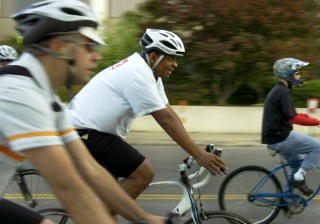Charlotte Mayor Anthony Foxx was unanimously confirmed yesterday by the full Senate to become the new chief of U.S. DOT. He’ll be sworn in soon, probably next week.

At Foxx's confirmation hearing, many senators submitted questions for the record – abbreviated to QFRs in Congressional parlance – and received answers before they had to vote on Foxx’s nomination. Those answers still aren’t public and won’t be until the official record from the hearing is published, which staffers say could take as long as six months. But Sen. Brian Schatz has released the answers to the questions he asked [PDF], and it just so happens he asked about bicycling and transit.
“The good news,” writes Caron Whitaker of the Bike League, is this: “His answers were positive. The bad news: The answers are so vague -- especially the one on performance measures -- it tells me we have a lot of work to do…”
Will Foxx follow through on LaHood’s pledge to update roadway design guidelines to better protect pedestrians and cyclists? Foxx commits to nothing more than “facilitating stakeholder discussions in this area.” He does say he understands “the importance of meeting the increasing needs of bicyclists and pedestrians and ensuring their safety,” and he touts the progress he helped make in improving Charlotte's bicycle network, establishing a bike-share system, and making pedestrian improvements, including connections to transit.
He also notes he supported a complete streets initiative. Great, so how would a Secretary Foxx see complete streets principles influencing federal policy? Oh, you know, “each community has a unique context.” No mention of a federal complete streets policy, like the one recently introduced in the House.
And in response to Sen. Schatz’s impressively sophisticated question on creating a separate set of performance measures for non-motorized transportation, without reducing the prevalence of biking and walking, comes this less impressive answer: He would “consider this and all comments received” on the matter. That’s a cold blowoff. He added that “bicycling and walking are an increasingly important part of our transportation network, and offering the public safe transportation choices would remain a priority at the Department if I am confirmed as Secretary.”
Well, we can all agree that the Partnership for Sustainable Communities is the bomb, right? What will you do in your first 60 days to clearly communicate that you prioritize this partnership and the principles that guide it? Will you meet with the heads of HUD and the EPA to discuss the future of the partnership in your first 90 days? Schatz wants to know.
Foxx, again, couldn’t be nailed down. “I support the Partnership for Sustainable Communities and, if confirmed, look forward to continuing to work closely with HUD and EPA in the next few years,” he said, noting his support for Charlotte’s efforts to become more livable and sustainable.
Perhaps we shouldn’t be surprised that he kept his options open in his answers to the QFRs – Cabinet nominees are notoriously evasive on the details of what they’ll do in office. Foxx’s history as a progressive mayor of a fast-growing city that has recently experienced a quantum leap in livability infrastructure is very promising, and it's no wonder advocates have been enthusiastic -- far more enthusiastic than they were about an unknown Ray LaHood when he was first nominated in 2008. But these answers do signal a need for advocates to press him hard to commit to action on important matters.





